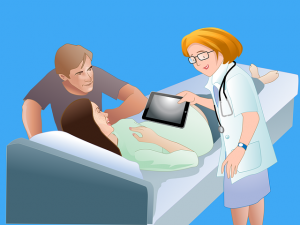The global conversation about the importance of women’s health is more prominent than ever before. In many countries around the world, both the medical community and the public are raising awareness about reproductive issues, embracing innovative treatment strategies, and fighting to increase access for all women. If you want to dedicate your medical career to advancing women’s health, Obstetrics and Gynecology may be the residency specialty area for you. As an obstetrician/gynecologist (OB/GYN), you would have the opportunity to spend every day working to support women’s health and wellness. Read on to learn more about starting your career in this challenging, dynamic field as a foreign medical graduate.
What It Means to Be an OB/GYN
The work of an OB/GYN centers on women’s reproductive health. That means much of your practice would be associated with pregnancy care. You might be involved in helping women address fertility issues as they try to get pregnant, making sure they stay healthy throughout their pregnancy, contributing to a successful labor and delivery process, and providing post-partum reproductive care to help them recover after the baby is born. However, you should also be aware that not all of your patients will be pregnant women. As a OB/GYN, you will also be prepared to diagnose and treat hormonal conditions in women across their lifespan–from early adolescence to late menopause–even in cases where the woman has no interest in getting pregnant at all.
It is important to note that work in obstetrics and gynecology can often be much more intimate than work in other specialty areas, like surgery or anesthesiology. As an OB/GYN, you will usually develop long-term relationships with your patients, and you are called to serve as a counselor for women who are making important family planning choices that shape the rest of their lives. Therefore, if your medical interests extend beyond reproductive anatomy and physiology into the field of psychology, a job as an OB/GYN may be particularly appealing.
The Road to Becoming an OB/GYN
A residency program in Obstetrics and Gynecology lasts for four years. Over the course of a program, you will have the opportunity to gain extensive experience in every aspect of women’s health. In some programs, you may also have the opportunity to focus your work in a particular subspecialty area of interest, such as reproductive endocrinology, infertility, urogynecology, maternal fetal medicine, gynecologic oncology, or pediatric gynecology. Some programs also offer basic, translational, or clinical research opportunities in these and other women’s health-related topics.
Alternatively, if you are particularly interested in the genetic components of women’s reproductive health, you may start your residency in an OB/GYN residency program and complete it in Medical Genetics residency program. As genetic counseling becomes an increasingly prominent field, more US-based programs are offering this as an option for residents. In order to fulfill the requirements for a Medical Genetics residency, you would spend your first two years in an OB/GYN program and the remaining two years in a Medical Genetics program. This is an ideal track for foreign medical graduates who are particularly interested in research and/or practice related to the genetic aspects of family planning and female reproductive health.
Getting Matched to a Residency Program in Obstetrics and Gynecology
Given the nature of the field of Obstetrics and Gynecology, you might automatically assume that you can only get matched to a residency program if you’re female. However, that may not be the case! While it is true that most residents who match to OB/GYN programs are female–about 82 percent, according to a 2017 report from the American Congress of Obstetricians and Gynecologists–it’s largely because so few men apply. In fact, according to recent reporting from National Public Radio, some residency programs actually look for passionate, dedicated male applicants who are ready to make a contribution to the field. Having a male OB/GYN on staff gives female patients more options–and increasing patient choice is a major goal in women’s healthcare today.
Regardless of your gender, one of the ways you can show a residency program that you are ready to take on a challenging career as an OB/GYN is by completing a graduate externship in the field. As a foreign medical graduate, it can be helpful to familiarize yourself with women’s reproductive healthcare in the United States before you apply for your residency. Not only can the experience add weight to the enthusiasm you express in your personal statement and your interviews, but it can also help you start building a network of connections in the field, including potential reference letter-writers.
No matter what specialty area you plan to pursue, FMG Portal is here to help you get matched to the US medical residency program of your dreams! Contact us today for more information!



